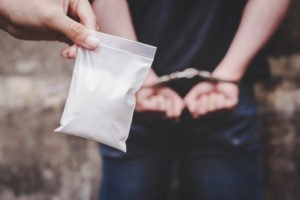
There are five effective strategies that criminal defense attorneys use to try and get a drug possession charge dismissed.
These are to show that:
- you did not “possess” a drug;
- you wish to enter a drug diversion program;
- you had a valid prescription for the drug;
- you did not know that the substance in possession was a “controlled substance;” and/or
- the police violated your constitutional rights.
Note that most states often charge simple possession as a misdemeanor offense. The crime is usually punishable by fines and/or jail time.
1. No Possession
You are only guilty of a criminal charge of possession if you did in fact possess a drug.
Further, “possession” has a precise legal definition. Illegal possession means that you have:
- actual possession of a drug, or
- constructive possession of a drug.1
Actual possession means that you have a drug on your person or have immediate access to it (for example, you are carrying a drug in a backpack).2
Constructive possession means that while you do not have immediate access to a drug, you have control over the drug. For example, you have constructive drug possession if you are storing drugs in a closet or a garage.3
If you can show that you did not have actual or constructive possession of a drug, you can get your possession charge dismissed.
2. Drug Diversion
One of the most common ways to get a simple possession charge dismissed is to enter a drug diversion program.
A drug diversion program is where you agree to complete drug treatment classes after getting charged with a possession crime.4
If you successfully complete treatment, then:
- the district attorney will dismiss your drug possession charge, and
- no charge or conviction gets placed on your criminal record.
But if you fail to complete treatment, then your drug possession case typically moves forward as if diversion never took place.
Eligibility for a diversion program is typically reserved for first-time offenders facing a misdemeanor drug crime.5
If you believe you are eligible for a drug diversion program, it is usually wise to seek legal advice from a law office/law firm or criminal defense lawyer. An attorney can help take the necessary steps to ensure you enter a program.
3. Valid Prescription
Sometimes a prosecutor can charge you with drug possession if you were in possession of a prescription drug.
Common drugs involved in these cases include:
- Vicodin,
- Oxycontin,
- Xanax, and
- Codeine.
But a common defense here is to show that you have a valid prescription for the drug. If you can show this, a prosecutor generally cannot say, beyond a reasonable doubt, that a drug offender was holding drugs illegally.
4. Lack of Knowledge
Possibly, yes. The drug laws of most states say that you are only guilty of a possession drug offense if you were:
- in possession of a controlled substance, and
- knew that the substance was in fact an illegal drug.6
This means you can always try to get a charge dismissed by showing a lack of knowledge.
Example: Joe’s friend gives him a plastic bag with some pills in it. The friend tells Joe that the pills are a type of over-the-counter medicine.
Joe later is walking through a park carrying the bag. A police officer sees him and eventually arrests him for drug possession.
If charged, Joe can likely get the charge dismissed since he did not know that the pills he had were in fact illegal drugs.
5. Illegal Police Conduct
You can likely get a possession charge dismissed if you can show that a law enforcement officer somehow violated your constitutional rights.
For example, it may be the case that the authorities:
- arrested you without probable cause,
- failed to read you your Miranda rights,
- performed an illegal search or seizure (for example, police searched your home without a valid search warrant), or
- coerced a confession.
If any of the above, then a defense attorney can file a motion to dismiss with the court. If the judge grants it, your charges will likely get dismissed.
Legal References:
- Black’s Law Dictionary, Sixth Edition – “Possess.”
- See same.
- See same.
- See, for example, California Penal Code 1000 PC.
- See, for example, Florida Statutes 948.08.
- See, for example, 720 Illinois Compiled Statutes 570/402.

